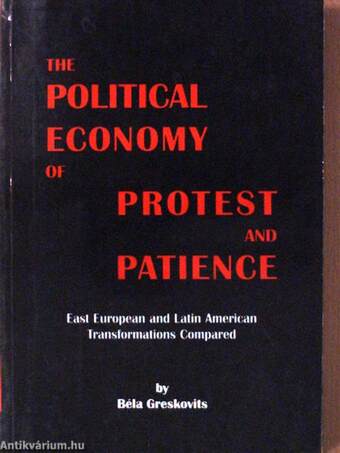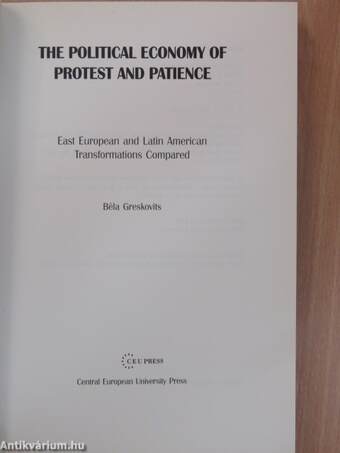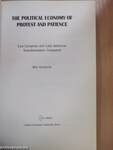1.067.317
kiadvánnyal nyújtjuk Magyarország legnagyobb antikvár könyv-kínálatát

VISSZA
A TETEJÉRE
JAVASLATOKÉszre-
vételek
The Political Economy of Protest and Patience
East European and Latin American Transformations Compared
| Kiadó: | Central European University Press |
|---|---|
| Kiadás helye: | Budapest |
| Kiadás éve: | |
| Kötés típusa: | Ragasztott papírkötés |
| Oldalszám: | 233 oldal |
| Sorozatcím: | |
| Kötetszám: | |
| Nyelv: | Angol |
| Méret: | 23 cm x 15 cm |
| ISBN: | 963-9116-13-0 |
naponta értesítjük a beérkező friss
kiadványokról
naponta értesítjük a beérkező friss
kiadványokról
Fülszöveg
Against a background of recession deeper and longer than that of the Great Depression,
democracy and the market economy seem to be taking root throughout Central and
Eastern Europe. How is this possible? Whyvhave Eastern Europeans protested less about
the brutal social consequences of systemic change than the people of Latin America did a
decade earlier? Why has a region-wide authoritarian or populist reaction not occurred
and why does democracy in these countries appear to be crisis-proof? In what way has
economic crisis affected the politics of the region? \ 1
Jn addressing these questions, Béla Greskovits, of Central European University, Budapest,
compares the Eastern European and Latin American transformations.
"This study by Béla Greskovits is a pioneering contribution to the application of contempo-
rary Western political economy to the East-Central European transformation process."
Jáfíbs Komái, Harvard University and Collegium Budapest
"This is a book which... Tovább
Fülszöveg
Against a background of recession deeper and longer than that of the Great Depression,
democracy and the market economy seem to be taking root throughout Central and
Eastern Europe. How is this possible? Whyvhave Eastern Europeans protested less about
the brutal social consequences of systemic change than the people of Latin America did a
decade earlier? Why has a region-wide authoritarian or populist reaction not occurred
and why does democracy in these countries appear to be crisis-proof? In what way has
economic crisis affected the politics of the region? \ 1
Jn addressing these questions, Béla Greskovits, of Central European University, Budapest,
compares the Eastern European and Latin American transformations.
"This study by Béla Greskovits is a pioneering contribution to the application of contempo-
rary Western political economy to the East-Central European transformation process."
Jáfíbs Komái, Harvard University and Collegium Budapest
"This is a book which deserves careful attention not only from specialists on Eastern
Europe, but from anyone generally interested in the political economy of economic
reform." . -
Robert R. Kaufman, Political Science Department, Rutgers University
"Through a comparative analysis rich in cases and equally informed by politics and eco-
nomics, theories and postcommunist trajectories, Greskovits provides a compelling answer
to one of the great puzzles of postcommunism: why draconian economic reforms have
failed to produce widespread popular protests."
Valerie Bunce, Political Science Department, Cornell University
"Béla Greskovits' The Polital Economy of Protest and Patience is the most ambitious and
thoughtful effort thus far to probe [these] questions by examining the parallels and con-
trasts in East European and earlier Latin American dual transformation. Greskovits provides
fresh and illuminating perspectives on why theories and predictions of the early 1990s
failed, how social and economic structure and historic legacies shaped public responses,
and the logic and limits of government strategies to reduce protest."
Joan M. Nelson, Overseas Development Council, Washington DC Vissza
Tartalom
Contents
Preface ix
List of Tables xi
List of Abbreviations xiii
Chapter 1. Introduction: Good-bye Breakdown Prophecies, Hello
Poor Democracies 1
Chapter 2. Crises and Neoliberal Transformations in the 1980s and
1990s 19
Chapter 3. The Loneliness of the Economic Reformer 35
Chapter 4. Local Reformers and Foreign Advisers 53
Chapter 5. The Social Response to Economic Hardship 69
Chapter 6. Rethinking Populism under Postcommunism 93
Chapter 7. Populist Transformation Strategies: The Hungarian Case
in Comparative Perspective 115
Chapter 8. Compensation as a Government Tactic 137
Chapter 9. Conflict, Social Pact, and Democratic Development in
Transforming Hungary 155
Chapter 10. Crisis-proof, Poor Democracies 177
Notes 189
Bibliography 199
Index 219
Témakörök
- Közgazdaságtan > Gazdaságpolitika
- Közgazdaságtan > Közgazdasági elméletek > Egyéb
- Közgazdaságtan > Gazdaságátalakítás > Egyéb
- Idegennyelv > Idegennyelvű könyvek > Angol > Közgazdaságtan > Gazdaságpolitika
- Idegennyelv > Idegennyelvű könyvek > Angol > Közgazdaságtan > Gazdaságátalakítás > Egyéb
- Idegennyelv > Idegennyelvű könyvek > Angol > Közgazdaságtan > Közgazdasági elméletek > Egyéb








